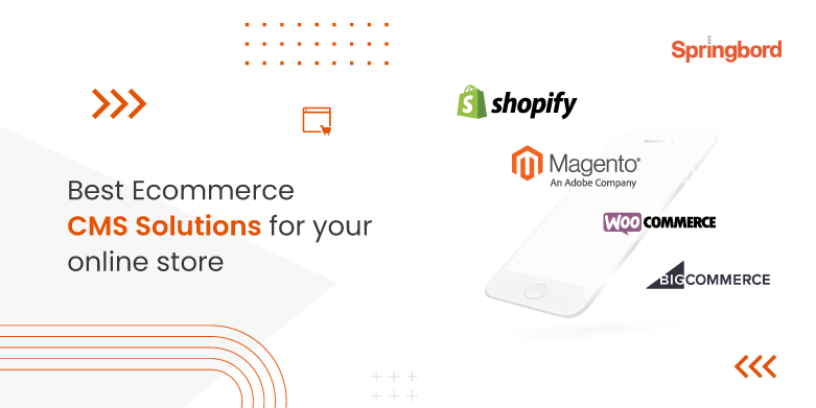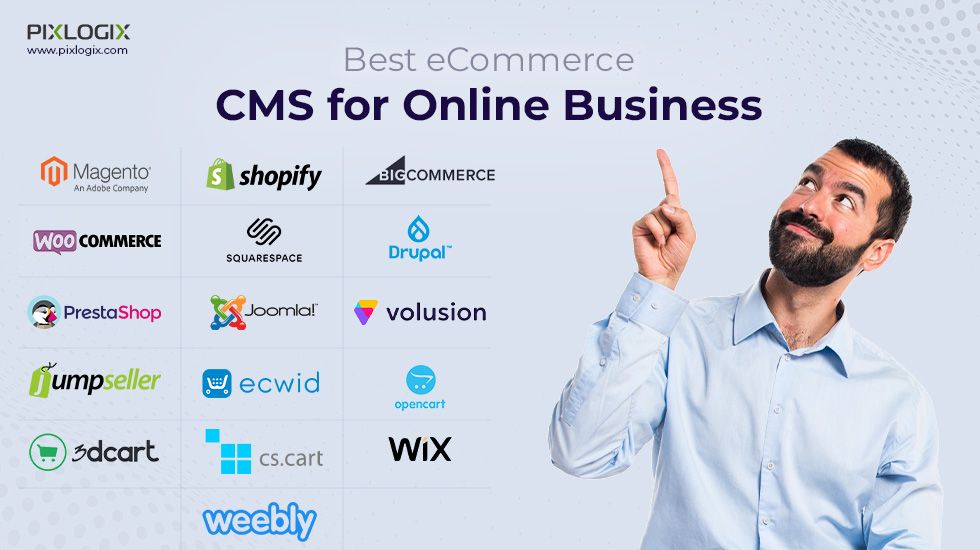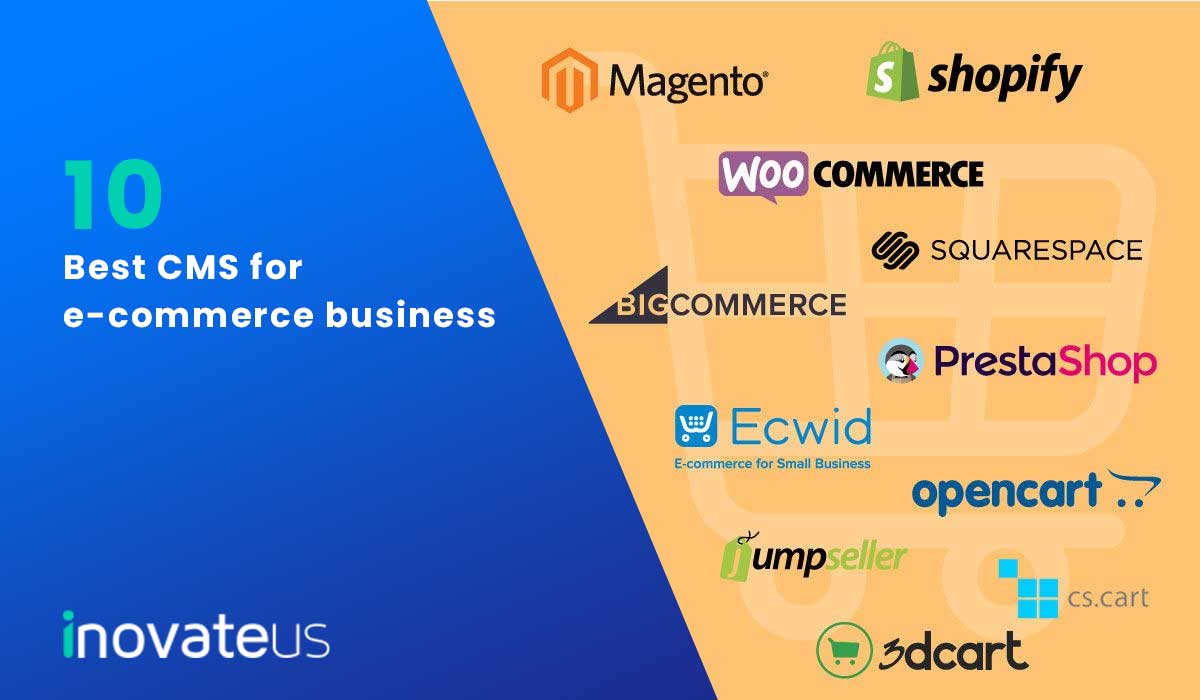Best CMS for Ecommerce: Unleash Your Online Potential
The best CMS for eCommerce is Shopify for its user-friendly interface and robust features. WooCommerce is also a top choice, especially for WordPress users.
Choosing the right content management system (CMS) for eCommerce can significantly impact your online success. A good CMS streamlines operations enhances user experience, and boosts sales. Shopify stands out for its ease of use and extensive app marketplace, making it ideal for beginners and experienced sellers alike.
WooCommerce offers flexibility and customization options, perfect for those already familiar with WordPress. Other notable options include Magento and BigCommerce, catering to various business sizes and needs. Selecting the best CMS helps create a seamless shopping experience, ensuring customer satisfaction and driving growth for your eCommerce venture.
Introduction To Ecommerce Cms
An Ecommerce CMS (Content Management System) simplifies online store management. It allows businesses to create, manage, and modify content easily. Choosing the right CMS is crucial for success. It can enhance user experience and boost sales.
The Role Of Cms In Ecommerce Success
A strong Ecommerce CMS plays a vital role in achieving success. Here are some key functions:
- Streamlines product management.
- Improves website design and usability.
- Optimizes for search engines.
- Facilitates payment processing.
- Enhances customer support.
With a reliable CMS, businesses can focus on growth. Better management leads to improved customer satisfaction. A happy customer buys more.
Key Features To Look For In An Ecommerce Cms
Not all Ecommerce CMS platforms are the same. Here are essential features to consider:
| Feature | Description |
|---|---|
| Ease of Use | User-friendly interface for quick setup and management. |
| Customization Options | Ability to tailor the site to fit your brand. |
| SEO Capabilities | Tools to optimize your site for search engines. |
| Mobile Responsiveness | Ensures your site looks good on all devices. |
| Security Features | Protects sensitive customer information. |
Choosing the right features can make a big difference. Focus on what fits your business needs.

Credit: www.springbord.com
Popular Ecommerce CMS Platforms
Choosing the right CMS is crucial for online success. Each platform offers unique features. Explore the top options below to find the best fit for your business.
Shopify: A User-friendly Giant
Shopify is known for its simplicity and ease of use. It offers a range of templates. Users can create stunning online stores quickly. Here are some key features:
- Drag-and-Drop Builder: Easy to customize your store.
- Secure Payment Options: Supports multiple payment gateways.
- 24/7 Support: Reliable customer service is available anytime.
Shopify is ideal for small to medium-sized businesses. It handles hosting and security, allowing you to focus on sales.
Magento: Scalability For Enterprises
Magento is perfect for large businesses. It offers powerful features and flexibility. Here are some advantages:
- Highly Customizable: Tailor your store to your needs.
- Robust Security: Protects sensitive customer data.
- Multi-Store Capability: Manage multiple stores from one platform.
Magento requires technical knowledge. It is best for businesses with dedicated IT resources.
Woocommerce: WordPress Integration Perks
WooCommerce is a plugin for WordPress. It transforms your site into an online store. Here’s why it’s popular:
- Seamless Integration: Works perfectly with WordPress themes.
- Cost-Effective: Free to start, with optional paid features.
- Large Community: Many resources and support options are available.
WooCommerce is suitable for small to medium-sized businesses. It offers flexibility and a familiar interface for WordPress users.
Self-hosted Vs Cloud-based Solutions
Choosing between self-hosted and cloud-based solutions can be tough. Each option has unique features. Understanding their benefits helps you decide. Here’s a breakdown of both types.
Benefits Of Self-hosted Platforms
Self-hosted platforms offer control and customization. You can tailor the site to meet specific needs. Here are some key benefits:
- Complete Control: You manage everything from hosting to security.
- Customization: Modify code and design freely.
- Cost-Effective: Lower long-term costs with the right setup.
- Data Ownership: You own and control all your data.
Advantages Of Cloud-based Ecommerce
Cloud-based ecommerce solutions are user-friendly and scalable. They require less technical knowledge. Here are some advantages:
- Easy Setup: Quick to launch with minimal technical skills.
- Scalability: Easily adjust resources as your business grows.
- Automatic Updates: Software updates happen without extra work.
- Accessibility: Access your store from anywhere with the internet.
| Feature | Self-Hosted | Cloud-Based |
|---|---|---|
| Control | Full Control | Limited Control |
| Customization | Highly Customizable | Less Customizable |
| Initial Cost | Higher Setup Cost | Lower Setup Cost |
| Maintenance | User Responsible | Provider Responsible |
Customization Capabilities
Customization capabilities are crucial for any eCommerce platform. They allow businesses to create unique online stores. Tailored designs and specific features can enhance user experience. Here, we explore key areas of customization.
Themes And Templates Flexibility
Choosing the right theme is essential. A good theme reflects your brand identity. Look for platforms that offer:
- Variety of themes: Choose from multiple designs.
- Responsive layouts: Ensure your site looks great on all devices.
- Easy customization: Modify colors, fonts, and layouts easily.
Many platforms also allow custom templates. This option provides complete control over design. You can create a truly unique shopping experience.
Adding Custom Features And Extensions
Custom features enhance functionality. They help meet specific business needs. Look for platforms that support:
- Extensions: Add new capabilities easily.
- API access: Integrate with other software.
- Custom code: Implement unique features tailored to your business.
Platforms like Shopify and WooCommerce excel in this area. They offer extensive libraries of plugins and extensions. This flexibility allows for significant customization.
| Platform | Themes Availability | Extensions Support | Custom Code |
|---|---|---|---|
| Shopify | Over 70 | 1,500+ | Yes |
| WooCommerce | Hundreds | 1,000+ | Yes |
| Magento | Thousands | 3,000+ | Yes |
With these customization capabilities, your online store can stand out. Choose a platform that best fits your needs and goals.
Security Considerations
Security is vital for any eCommerce platform. It protects sensitive information. Customers trust your site with their data. A secure CMS builds that trust. Let’s explore key security aspects.
Protecting Customer Data
Customer data protection is a top priority. Secure systems prevent data breaches. Here are essential measures:
- Encryption: Use SSL certificates to encrypt data.
- Access Control: Limit access to sensitive data.
- Secure Payment Gateways: Use trusted payment processors.
- Data Backup: Regularly back up customer data.
Using these practices helps safeguard your customers’ information. It builds confidence in your brand. A secure site encourages more purchases.
Regular Updates And Maintenance
Keeping your CMS updated is crucial. Updates often fix security flaws. Regular maintenance ensures optimal performance. Follow these steps:
- Set up automatic updates for plugins and themes.
- Regularly check for software updates.
- Audit your site for vulnerabilities.
- Remove unused plugins and themes.
Regular updates reduce security risks. They keep your site running smoothly. A well-maintained site provides a better user experience.
Mobile Optimization And Responsiveness
Mobile optimization is essential for eCommerce success. Many shoppers use mobile devices. A responsive design ensures a seamless experience. This boosts sales and customer satisfaction.
The Importance Of Mobile-friendly Design
Mobile-friendly design is vital for online stores. Here are key reasons:
- Increased Traffic: More users shop on phones.
- Improved User Experience: Easy navigation leads to happy customers.
- Higher Conversion Rates: Simple checkout encourages purchases.
- Better SEO Rankings: Google favors mobile-optimized sites.
Ignoring mobile design can hurt sales. Customers may abandon a site that is hard to use. Focus on creating a great mobile experience.
Responsive Themes And Checkout Processes
Responsive themes adapt to any screen size. They provide a consistent look and feel. Choose themes that are:
- Lightweight for faster loading times.
- Customizable for brand identity.
- Compatible with various devices.
Checkout processes must also be responsive. Customers should complete purchases easily. Here are best practices:
- Single-page Checkout: Reduces steps to finish a purchase.
- Clear Call-to-Action Buttons: Make buttons easy to find.
- Auto-fill Options: Save time for returning customers.
Responsive design enhances the shopping experience. It builds trust and loyalty among customers.
Integrations And Plugins
Integrations and plugins enhance the functionality of your eCommerce site. They help you connect with various services. This capability boosts performance and improves user experience. Choosing the right CMS with these features is crucial.
Extending Functionality With Plugins
Plugins are tools that add features to your eCommerce site. They can simplify tasks, improve design, and enhance security.
- Payment Gateways: Accept payments easily.
- SEO Tools: Optimize your site for search engines.
- Analytics: Track user behavior and sales.
- Shipping Solutions: Manage logistics efficiently.
- Social Media Integrations: Connect with your audience.
Seamless Integration With Third-party Services
Integrating with third-party services is vital for eCommerce success. It streamlines operations and improves customer satisfaction.
| Service | Benefit |
|---|---|
| Payment Processors | Fast and secure transactions. |
| Email Marketing Tools | Automate campaigns effectively. |
| Inventory Management | Keep stock levels accurate. |
| CRM Systems | Manage customer relationships better. |
Choose a CMS that supports these integrations. This choice enhances your store’s capabilities. It allows you to focus on growth and customer satisfaction.

Credit: www.pixlogix.com
Cost Analysis And Budget Planning
Choosing the right CMS for eCommerce requires careful cost analysis. A well-planned budget ensures you invest wisely. Understanding pricing models helps in making informed decisions.
Understanding Pricing Models
Different eCommerce CMS platforms offer various pricing models. Here are the main types:
- Subscription-Based: Monthly or yearly fees.
- One-Time Payment: Pay once for lifetime access.
- Freemium: Basic services for free, advanced features at a cost.
- Commission-Based: Pay a percentage of sales.
Each model has its advantages. Choose one that fits your business needs.
Calculating Total Cost Of Ownership
The total cost of ownership (TCO) includes all expenses over time. Consider these factors:
- Initial Setup Costs: Domain, hosting, and design.
- Monthly Fees: Subscription costs and service fees.
- Transaction Fees: Charged by payment gateways.
- Maintenance Costs: Updates and support services.
- Marketing Costs: SEO, ads, and promotions.
Use this simple formula to calculate TCO:
TCO = Initial Setup + Monthly Fees + Transaction Fees + Maintenance + Marketing
Creating a detailed budget helps manage costs effectively. Track all expenses for better financial control.
Seo And Marketing Tools
Effective SEO and marketing tools are essential for eCommerce success. They help increase your store’s visibility and drive more sales. A good CMS offers built-in features and plugins to enhance your online presence.
Built-in Seo Features For Higher Visibility
Many eCommerce CMS platforms come with built-in SEO features. These tools help optimize your store for search engines. Key features include:
- Customizable Meta Tags: Edit title and description tags easily.
- SEO-friendly URLs: Create clean and descriptive URLs.
- Image Alt Text: Add alt text for all product images.
- XML Sitemap: Automatically generate a sitemap for search engines.
- Mobile Optimization: Ensure your site is mobile-friendly.
These features improve your store’s chances of ranking higher in search results. A higher rank leads to more traffic and potential sales.
Marketing Plugins To Drive Sales
Marketing plugins enhance your eCommerce store’s functionality. They can boost your sales and customer engagement. Popular marketing tools include:
| Plugin | Functionality |
|---|---|
| Mailchimp | Email marketing and automation tools. |
| Yoast SEO | SEO optimization and content analysis. |
| OptinMonster | Lead generation and conversion optimization. |
| Google Analytics | Track website performance and user behavior. |
Using these plugins can significantly improve your marketing strategy. They help you reach more customers and convert visitors into buyers.

Credit: novateus.com
User Support And Community
User support and community are vital for any eCommerce CMS. They provide help and resources. A strong community enhances the user experience. Let’s explore the key aspects of support and community.
Access To Support Resources
Good eCommerce CMS platforms offer various support resources. These include:
- Documentation: Detailed guides and FAQs.
- Forums: Active discussion boards for user interaction.
- Live Chat: Instant assistance from support teams.
- Email Support: Direct contact for complex issues.
Easy access to these resources helps users solve problems quickly. A responsive support team reduces downtime. Check the support options before choosing a CMS.
The Value Of A Strong User Community
A strong user community provides numerous benefits. These include:
- Peer Support: Users can share solutions and tips.
- Learning Opportunities: Access to tutorials and webinars.
- Networking: Meet other business owners and entrepreneurs.
- Feedback: Users can suggest improvements to the CMS.
Communities foster collaboration. They create an environment where users thrive. Choose a CMS with an active user community for better engagement.
Real-world Success Stories
Success stories in ecommerce inspire many entrepreneurs. They show what is possible with the right tools. Here, we explore case studies of successful ecommerce stores. We also share lessons learned from ecommerce veterans.
Case Studies Of Successful Ecommerce Stores
Many ecommerce businesses have thrived using the right CMS. Here are a few examples:
| Store Name | CMS Used | Key Achievement |
|---|---|---|
| Fashion Nova | Shopify | Over $1 billion in sales |
| Gymshark | Magento | Rapid growth to $1.5 billion valuation |
| Allbirds | WooCommerce | Revolutionized eco-friendly footwear |
These stores chose specific CMS platforms. They achieved great results with tailored features. Their stories motivate new ecommerce ventures.
Lessons Learned From Ecommerce Veterans
Ecommerce veterans share valuable insights. Here are some lessons they emphasize:
- Focus on User Experience: Easy navigation boosts sales.
- Mobile Optimization: Ensure your site is mobile-friendly.
- SEO Best Practices: Use keywords effectively to attract traffic.
- Data Analysis: Regularly analyze customer behavior.
- Community Engagement: Build a loyal customer base.
Implementing these lessons can lead to success. Pay attention to what works for others. Adapt these strategies to your own ecommerce store.
Future Trends In Ecommerce Cms
The world of ecommerce is rapidly evolving. New technologies shape how businesses operate. Understanding future trends in ecommerce CMS is essential. These trends will help businesses thrive and attract customers.
Emerging Technologies Impacting Ecommerce
Several technologies are transforming ecommerce CMS. Here are some key trends:
- Artificial Intelligence (AI): AI enhances customer experiences. It provides personalized recommendations and chatbots for support.
- Augmented Reality (AR): AR allows customers to visualize products. This improves buying confidence and reduces returns.
- Voice Search: Voice-activated assistants are gaining popularity. Optimizing content for voice search is crucial.
- Blockchain: This technology ensures secure transactions. It enhances trust between buyers and sellers.
- Headless Commerce: This approach separates the frontend and backend. It provides flexibility and faster updates.
Predictions For The Next Big Cms Features
Future ecommerce CMS will introduce exciting features. Businesses should prepare for these innovations:
- Advanced Analytics: More in-depth insights into customer behavior.
- Enhanced Mobile Experience: Mobile optimization will be a priority.
- Subscription Models: CMS will support recurring payment options.
- Omnichannel Integration: Seamless experience across all platforms.
- Automated Marketing: Tools to manage campaigns will become smarter.
Staying updated with these trends ensures success. Businesses can leverage new features to enhance customer satisfaction. Embracing change is vital for long-term growth.
Conclusion: Choosing The Right Cms
Selecting the best CMS for your eCommerce store is crucial. The right choice impacts your business growth, user experience, and overall success. Each CMS offers unique features tailored to different needs.
Summarizing Key Takeaways
- Ease of Use: Choose a CMS that is user-friendly.
- Scalability: Ensure it grows with your business.
- Customization: Look for flexible design options.
- SEO Features: Pick a platform with strong SEO tools.
- Support: Opt for a CMS with reliable customer service.
Next Steps After Selecting A Cms
- Set up your online store.
- Choose a suitable theme or template.
- Add essential plugins or extensions.
- Upload your products with detailed descriptions.
- Test the checkout process thoroughly.
Follow these steps for a smooth launch. Monitor your site’s performance. Adjust settings as needed to optimize user experience.
Frequently Asked Questions
What Is The Best Cms For Ecommerce?
Shopify is often considered the best CMS for eCommerce due to its user-friendly interface and extensive features.
How Does WordPress Compare To Ecommerce?
WordPress, combined with WooCommerce, offers flexibility and customization options, making it a strong competitor for eCommerce.
Can I Use Wix For Ecommerce?
Yes, Wix provides eCommerce capabilities with customizable templates and easy setup for online stores.
What Features Should An Ecommerce Cms Have?
Essential features include payment gateways, inventory management, SEO tools, and responsive design for mobile users.
Is Magento Suitable For Small Businesses?
Magento is powerful but complex, making it better suited for medium to large businesses with technical expertise.
Conclusion
Choosing the right CMS for your eCommerce site can significantly impact your success. Consider your specific needs, budget, and technical skills. Each platform offers unique features to enhance your online store. Take the time to explore your options and select the one that aligns best with your business goals.
Happy selling!




